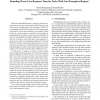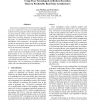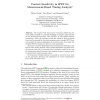22 search results - page 2 / 5 » Fully Automatic, Parametric Worst-Case Execution Time Analys... |
ISORC
2008
IEEE
14 years 2 months ago
2008
IEEE
The analysis of the worst-case execution time (WCET) requires detailed knowledge of the program behavior. In practice it is still not possible to obtain all needed information aut...
RTAS
2008
IEEE
14 years 2 months ago
2008
IEEE
Real-time schedulability theory requires a priori knowledge of the worst-case execution time (WCET) of every task in the system. Fundamental to the calculation of WCET is a schedu...
WORDS
2003
IEEE
14 years 1 months ago
2003
IEEE
Bounding the Worst Case Execution Time (WCET) of programs is essential for real-time systems. To be able to do WCET calculations, the iteration bounds for loops and recursion must...
RTAS
2008
IEEE
14 years 2 months ago
2008
IEEE
Instruction scratchpads have been previously suggested as a way to reduce the worst case execution time (WCET) of hard real-time programs without introducing the analysis issues p...
ISOLA
2010
Springer
13 years 6 months ago
2010
Springer
Abstract. The Implicit Path Enumeration Technique (IPET) has become widely accepted as a powerful technique to compute upper bounds on the Worst-Case Execution Time (WCET) of time-...



